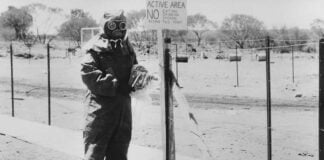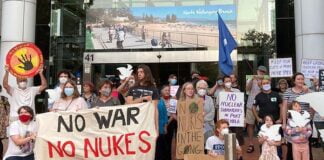IN ITS campaign for yet another war, members of George W Bush’s decaying administration have been making almost daily condemnations of Iran over its uranium enrichment and its support for Hamas, Hezbollah or Shia militias inside Iraq.
Yet last December a National Intelligence Estimate released by the US’s top spy agencies concluded that Iran had abandoned the bomb more than three years ago. And the International Atomic Energy Agency insists that its inspections aren’t hindered by Iranian authorities.
Depite the US’s best efforts, Iran’s influence across the region is on the increase. Even though it supported the 2003 Iraq invasion, the Iranian regime is posing as the region’s anti-imperialist hero. But the spectre of the imperialist threat is also helping it to clamp down on internal dissent. Before Bush’s infamous “axis of evil” speech in 2002, there were thriving movements in Iran seeking greater political rights, women’s and workers’ rights, press freedoms, and gay and lesbian rights. But the nationalist mood unleashed by the US’s bellicose stance towards Iran has weakened and marginalised them.
Such dynamics could be seen in Iran’s recent parliamentary elections-the eighth since the 1979 revolution. The vast majority of reformist candidates were disqualified by the all-powerful Council of Guardians, which consists of unelected clerics and lawyers. As a result, the reformists’ vote and number of MPs in the new Majlis barely held up.
However, there were also the divisions within the conservative camp, based on criticism of Ahmadinejad’s poor handling of the economy and his failure to convince the West that its nuclear industry is civilian in nature. His critics include former nuclear negotiator Ali Larijani and Tehran mayor Mohammad-Baqer Qalibaf, who are likely to challenge Ahmadinejad in next year’s presidential elections.
At last count, the critics’ Broad Principle-ist Front had won 75 of the 290 seats, while Ahmadinejad’s United Principle-ist Front had 88. Two reformist groupings had 40, along with 49 independents. Run-off elections are scheduled for April 25 to determine the undecided seats.
However behind the headlines many voters, particularly the young, boycotted the polls. This was despite pleas from Iran’s leaders and the state-run media for people to exercise their “patriotic duty”. Polling hours were extended late into the night to encourage a greater turnout. After the poll, 60 per cent voter participation was claimed.
Yet in Tehran, where progressives are concentrated, the official turnout was only 40 per cent. In addition to cynicism about the electoral process, many remain disillusioned with the experience of the reformists in power. President Khatami (1999-2005) was unwilling to actually challenge the power of the theocracy, and living standards fell as they too embraced neo-liberal economic policies.
The anti-war movement and other activists in Australia need to bring campaigns against threats to attack Iran together with campaigns for human rights and solidarity for those fighting for greater democracy in Iran. This will build the most effective anti-imperialist struggle against any threat to Iran.
By Mark Goudkamp





